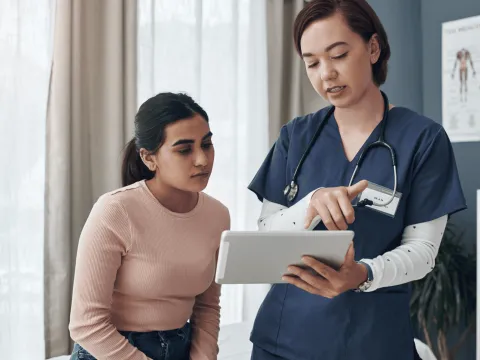- UChicago Medicine AdventHealth

Choose the health content that’s right for you, and get it delivered right in your inbox.
Living with diabetes means keeping a close eye on your whole health. While diabetes can affect many parts of the body, your eyes are especially vulnerable to changes that may go unnoticed until they become serious.
We’re answering five common questions about how diabetes can affect your eye health to help you recognize the signs of diabetes-related eye disease and take steps toward early detection and prevention.
- How does diabetes affect the eyes?
-
Elevated blood sugar caused by diabetes can lead to vision changes or eye conditions, including:
- Blurred vision
- Cataracts
- Diabetic macular edema
- Diabetic retinopathy
- Dry eyes
- Eye floaters
- Glaucoma
Over time, these conditions can interfere with everyday activities, like driving, reading and recognizing faces. And when left unmanaged, diabetes-related eye disease can lead to permanent vision loss.
- What is diabetic eye disease and who is at risk?
-
Diabetic eye disease is a group of eye conditions that can affect people with diabetes. This may include:
- Cataracts: cloudy eye lenses that can be caused by glucose deposit buildup
- Diabetic macular edema: swelling and fluid buildup in the center part of the retina
- Diabetic retinopathy: damaged blood vessels in the retina that can lead to vision impairment
- Glaucoma: increased eye pressure, fluid buildup and optic nerve damage
Anyone with diabetes — whether it’s Type 1, Type 2 or even gestational diabetes — is at risk for diabetic eye disease. Even people with prediabetes may begin to experience blood vessel damage, which is why early detection and prevention are essential.
- What are the symptoms of diabetes-related eye disease?
-
Symptoms of diabetic eye disease can vary, but you may experience one or more of the following:
- Blind spots in your vision
- Blurred or fluctuating vision
- Double vision
- Reduced peripheral vision
- Seeing spots or floaters
- Trouble seeing in dim light or at night
Though these symptoms are common, people may not experience any noticeable symptoms at all in the early stages of diabetes-related eye diseases. Whether or not you have any of these symptoms, if you have diabetes, it’s important to maintain a healthy blood sugar level and schedule annual eye examinations.
Diabetic retinopathy is the leading cause of blindness in adults, and the longer your condition goes unmanaged, the more severely it may affect your long-term vision.
- Can I prevent eye damage from diabetes?
-
In many cases, yes, it is possible to prevent diabetes-related eye disease. The best way to prevent damage is to control your blood sugar levels, along with your blood pressure and cholesterol levels. Regular physical activity is a great way to help you manage diabetes effectively, as it can improve your whole health, including your blood sugar, blood pressure and cholesterol.
If you have any type of diabetes, regular eye examinations are especially important so that you can have an up-to-date picture of your eye health. And while it may not be the most convenient, we encourage you not to skip getting your eyes dilated, as it can help your eye doctor spot any problems early.
Not smoking also lowers your risk for diabetes-related eye disease, so quitting is a great way to improve your health.
- What should my blood sugar level range be to prevent diabetic retinopathy?
-
Talk to your doctor about your target blood sugar range. Maintaining blood sugar levels within that range is a great first step. The American Diabetes Association recommends that most people with diabetes aim for an A1C lower than 7%. However, it’s important to work closely with your doctor and regularly test your blood sugar levels at home as well to maintain a clearer picture of your unique health.
Keeping a Close Eye on Your Health
If you’re living with diabetes, understanding how it affects your vision is just one step toward feeling whole. Find trusted care and compassionate support from our diabetes specialists so you can take charge of your health today.
